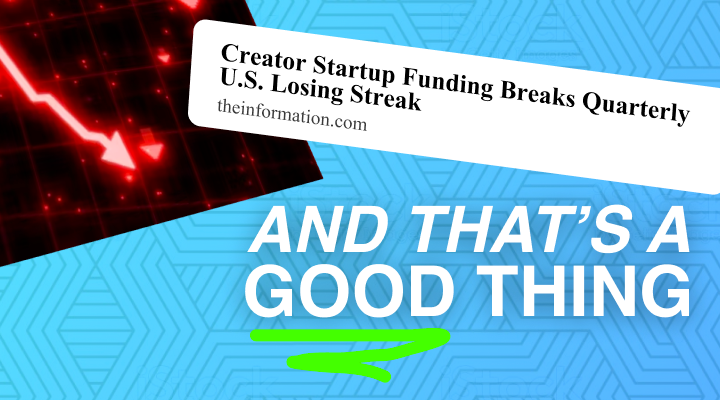In 2018, I created a collaboration platform for creators called Lumastic. For the first few years, we funded the company solely with prize money from pitch competitions. With my background running an educational YouTube channel, we won most of the time off the sheer novelty of my presentation style.
But it was still a painful experience explaining to a room of 50-year-old investors that there was a whole new class of small business owner that made a living making videos on the internet. The word "creator" still meant "God" back then. So, I had to use terms like, "independent internet media company" and hope to God that none of them would go on a tangent about how "Instagram influencers only get paid in free stuff" or how "it's hard to make money as an artist".
One time, though, there was a savvy investor in the room who knew what I was talking about. They knew about YouTubers and the advertising space and nodded as I went through my deck. At the end of my presentation, I opened it up for questions and they raised their hand...
"Your deck is great, but I don't think this is a venture scale business. Small business software is a hard market to be in, and there are very few creators in your TAM (total addressable market) that actually make enough money to buy your product. So, if you're lucky, this is a multi-million dollar business - but this will never be a billion dollar company."
😮💨 Sadly, not all investors are this smart.
Over the past 3 years, there's been a lot of hype around "creator focused" startups. In 2021, venture capitalists invested more that 5 billion dollars in startups building tools and platforms to power the creator economy. However, in 2023, only 2 billion dollars were invested in the industry.
The reasoning for the dramatic change? Well, because the investor that raised their hand after my pitch was totally right. This industry is small and doesn't create the scale neccessary for venture-backed returns. Software designed for creators is software designed for a small group of small business owners.
VCs have realized this over the past year, and that's why they aren't investing as heavily in creator focused companies. But this doesn't mean you shouldn't build products for creators. In fact, if you really care about this industry, I think there's no better time to get started.
Why? A couple reasons...
🧱 Brick walls.
One of my influences, Randy Pausch, said that...
Brick walls are there for a reason. The brick walls are not there to keep us out. The brick walls are there to show how badly we want something. Because the brick walls are there to stop the people who don’t want something badly enough. They are there to keep out the other people.
I think having less VC money in the creator economy is a net positive for the ecosystem. When an industry is flooded with cash, it creates a gold rush. People come in to get rich quick with no regard to how their mining will affect the environment or the people that live and work there.
This is what we saw in 2021 and 2022 with the rise and demise of NFTs. Crypto grifters and startup bros came into the creator community with millions of dollars and convinced hundreds of creators to help them peddle ponzi schemes - with no regard to how that would affect the creator's relationship with their audience or their business long-term.
Increasing the difficulty for startups and VC backed companies to exist in the creator economy won't prevent passionate entrepreneurs who care about this industry from building for it. It'll just keep the people who don't want it badly from doing it.
🥾 Bootstrapping fosters sustainability.
Startups are nothing but volatile. With a goal to burn cash, grow fast, and be prolific rather than profitable, the employees and customers within the orbit of these extreme businesses are in a constant state of whiplash.
When Silicon Valley Bank failed earlier this year, hundreds of startups lost access to their accounts and went out of business. One of those businesses was the payroll management system for the bakery where my wife works. They had to scramble to switch systems, refile paperwork, reconnect bank accounts, and retrain their employees so that everyone got their paycheck.
Obviously, this inconvenience to their customers wasn't a direct fault of the founders. Instead, it was an outcome of the system they tried growing their business in - one that values taking overly risky bets and running razor thin margins in the spirit of "reinvesting for growth".
Even outside of the SVB crash, stories of startups raising millions of dollars, aquiring customers rapidly, and then folding when they run out of money - leaving those customers out to dry - is all too common. This way of doing business is so normal that we don't even recognize how disrespectful it is to the customers and communities they claim to serve.
That's why I think having an ecosystem of companies in the creator economy that need to think about sustainability over speed is such a good thing. Founders without access to venture capital need to be more conservative and cognizant with their cash. They need to focus on traditional business best practices that set them up to be profitable from day one.
That type of mindset might seem harder in the short-term if you're a founder, but over the long-term it pays dividends. Building a sustainable business means you grow slow and strong instead of fast and fickle. It means garnering trust with the community over time instead of buying it and burning it.
💪 Credibility over capital.
VC backed startups spend 30-50% of the money they've raised on marketing. Contrast this with the 5-10% of revenue that the average small business spends.
The rationale behind this absurd spending is a tactic called "blitzscaling". Essentially, blitzscaling is the practice of growing fast by paying more to acquire customers than you make from them.
Sound stupid? It is.
The concept is that by taking these heavy losses, a startup can capture the market and squeeze out competitors that can't endure those same losses. Then, once the dust settles, that business can jack up prices over time until they become profitable.
To do that though, companies need capital. Which means "competition" in startup land isn't about who can build the better product or have the best customer service. No, the competition is over who can raise the most money.
Blitzscaling is a zero-sum game that stifles innovation and leaves customers with worse options over time. That's why I'm jazzed if VCs want to ignore the creator economy. Because without the capital necessary to blitzscale, companies in the creator economy can't just buy notoriety.
Instead, these companies have to rely more on word of mouth, community events, and engaging 1-1 with creators to grow. And if these companies want access to greater forms of distribution, they need to make strategic partnerships with creators to use their platforms to drive customer acquisition. That means we'll see more creators on boards of companies or even as founders.
By basing competition on credibility over capital, we create fertile ground for healthy, valuable, and sustainable companies that are expected to not just sell products, but contribute to the wider creator community.
🤔 Looking ahead.
I'm excited for the end of the startup hype cycle around the creator economy. I think it's going to lead to more innovation, deeper connections between creators and founders, and more niche products that truly cater to the unique needs of this new class of small business owner.
This industry is still so new. So, if you're a founder or a creator with big ideas, now is the time. And if you need any help or need a soundboard, please feel free to reach out. Also, if you want to get notified the next time I post, you can subscribe to my newsletter using the form below.
Until next time.

